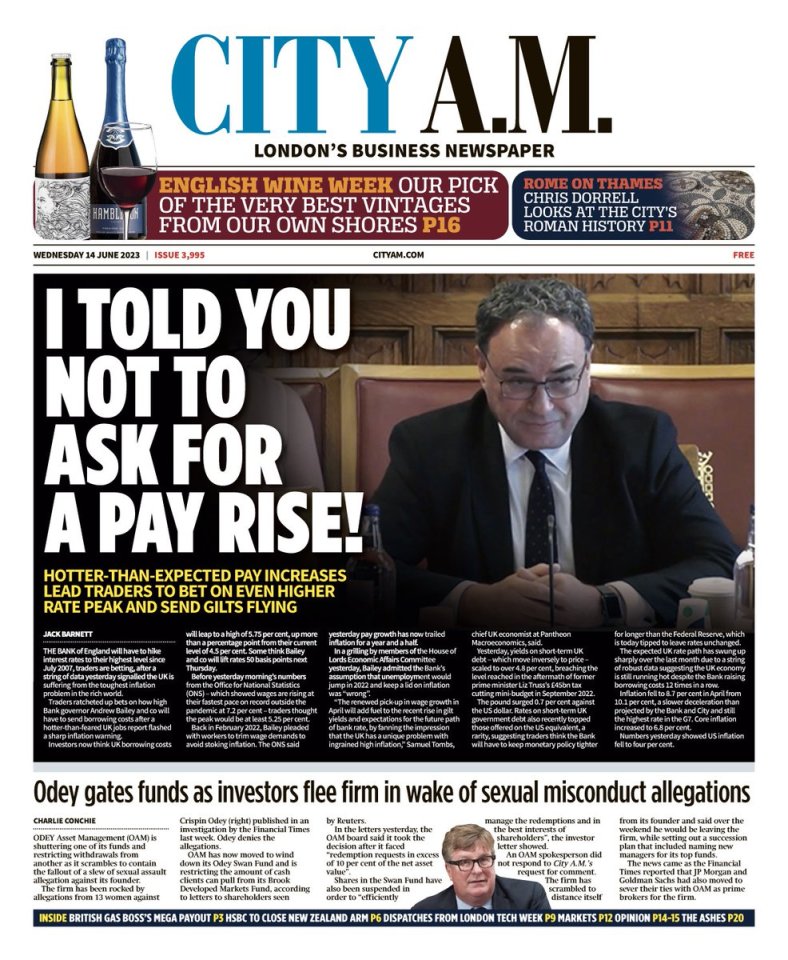UK economy swings back to growth but spectre of recession looms amid interest rate fears

Britain’s economy swung back to growth in spring, but the recent turmoil in the mortgage market and the prospect of the Bank of England hiking interest rates aggressively has put the risk of a recession back on the table.
Official figures out today from the Office for National Statistics (ONS) showed gross domestic product – a measure of all goods and services made in the UK – jumped 0.2 per cent in April, up from a 0.3 per cent contraction in March.
That was slightly below the City’s expected 0.3 per cent growth rate. The economy grew just 0.1 per cent in the three months to April.
April’s expansion was mainly driven by the services sector – which generates around £2 in every £3 of Britain’s output – motoring and Brits headed to the pub.
“Bars and pubs had a comparatively strong April, while car sales rebounded and education partially recovered from the effect of the previous month’s strikes,” Darren Morgan, director of economic statistics at the ONS, said.
Britain’s economy has outperformed forecasts since the turn of the year, steering clear of a much tipped recession.
Economists at the Bank of England, International Monetary Fund, Organisation for Co-operation and Development and the Office for Budget Responsibility had all projected the UK was on course for a tough recession this year. All have ditched that call now.
But, a series of data points that have shown the economy is holding up well in response to the Bank of England’s twelve successive interest rate increases has raised concerns about inflation hanging around.
Inflation – running at 8.7 per cent – and higher interest rates, now at 4.5 per cent, are already crimping the economy by knocking spending and business investment.
Chancellor Jeremy Hunt said: “High growth needs low inflation, so we must stick relentlessly to our plan to halve the rate this year to protect family budgets.”
Speaking to Sky News today, Hunt said the Bank has “no alternative” but to keep raising borrowing costs to curb price increases.
The government has promised to halve inflation by the end of the year, though there is a risk it may not drop to that level.

Such an upward move by Bank Governor Andrew Bailey and the rest of the monetary policy committee would heap more pressure on households and businesses, raising the spectre of recession once again.
“While the outlook has improved, the UK economy still faces major headwinds. In stark contrast to the US and Eurozone, inflation has proven more persistent than originally anticipated, continuing to put pressure on households’ income,” Yael Selfin, chief economist at KMPG UK, said.
“As a result, the UK will also likely see the Bank of England continue its rate hiking cycle, putting further pressure on both households and businesses as they face higher borrowing costs,” she added.
This morning’s GDP figures covered the month to April, meaning they will not have taken into account the recent steep rise in UK debt rates.
Experts have warned that activity could slow as homeowners switch onto new mortgages at much higher rates throughout the year. Some have estimated more than 1m Brits will slip onto a higher rate mortgage this year.
“With the full drag from high interest rates yet to be felt, it is too soon to sound the all clear,” Ruth Gregory, deputy chief UK economist at consultancy Capital Economics, said.
“We think interest rates need to rise further to quash inflation, from 4.5 per cent now to a peak of 5.25 per cent. That’s why we still think a recession is on its way in the second half of this year,” she added.